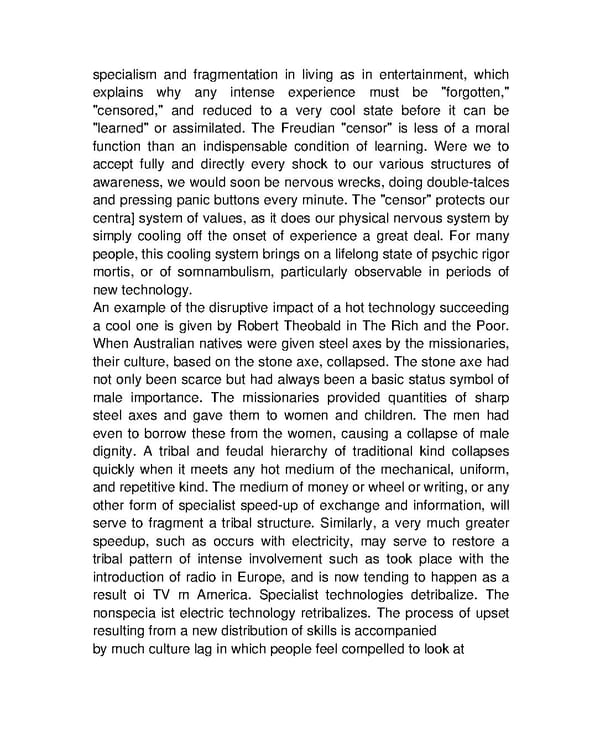specialism and fragmentation in living as in entertainment, which explains why any intense experience must be "forgotten," "censored," and reduced to a very cool state before it can be "learned" or assimilated. The Freudian "censor" is less of a moral function than an indispensable condition of learning. Were we to accept fully and directly every shock to our various structures of awareness, we would soon be nervous wrecks, doing double-talces and pressing panic buttons every minute. The "censor" protects our centra] system of values, as it does our physical nervous system by simply cooling off the onset of experience a great deal. For many people, this cooling system brings on a lifelong state of psychic rigor mortis, or of somnambulism, particularly observable in periods of new technology. An example of the disruptive impact of a hot technology succeeding a cool one is given by Robert Theobald in The Rich and the Poor. When Australian natives were given steel axes by the missionaries, their culture, based on the stone axe, collapsed. The stone axe had not only been scarce but had always been a basic status symbol of male importance. The missionaries provided quantities of sharp steel axes and gave them to women and children. The men had even to borrow these from the women, causing a collapse of male dignity. A tribal and feudal hierarchy of traditional kind collapses quickly when it meets any hot medium of the mechanical, uniform, and repetitive kind. The medium of money or wheel or writing, or any other form of specialist speed-up of exchange and information, will serve to fragment a tribal structure. Similarly, a very much greater speedup, such as occurs with electricity, may serve to restore a tribal pattern of intense involvement such as took place with the introduction of radio in Europe, and is now tending to happen as a result oi TV m America. Specialist technologies detribalize. The nonspecia ist electric technology retribalizes. The process of upset resulting from a new distribution of skills is accompanied by much culture lag in which people feel compelled to look at
 Understanding Media by Marshall McLuhan Page 31 Page 33
Understanding Media by Marshall McLuhan Page 31 Page 33